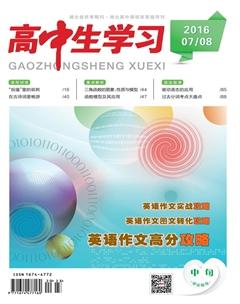几种固定时态的运用
张前华
英语时态共有四种体(form):完成体、一般体、进行体和完成进行体。时间(time)也有四种:现在、过去、将来和过去将来。但日常使用较频繁的只有十来种,而用来作为考点的时态则更少。主要是一般现在时,一般过去时,现在进行时,过去进行时,将来时,现在完成时和过去完成时等。近几年的高考试卷中,现在完成时、过去完成时、过去时、现在时(多以考查被动语态的形式出现)和进行时则是考查的重点。所以说,虽然英语时态有很多种,掌握起来比较困难,但有些情况下时态又是固定的,相对而言显得“千篇一律”。只要记住这些固定时态,就会收到事半功倍之效果。
[现在时]
一般现在时的特点:表示惯性动作、表示目前状态、表示真理或(已故)重要人物的观点、表示将来、表示传媒或艺术作品的现时性等。
When do the trains leave? (表示将来)
Time and tide wait for no man. (表示真理)
The old folk live in the distant area. (表示目前状态)
Ill show you the picture the moment you come. (表示将来)
Everybody eats, drinks, and sleeps every day. (表示惯性动作)
The poor old lady always tells us the same story every time she meets us. (表示惯性动作)
Cao Xueqin is the author of the great novel, “The Red Mansion”. (表示艺术作品的现时性 )
1. 间接引语的内容为真理、谚语、格言等时,引语部分用一般现在时。如:
The teacher told his pupils that the earth is round.
Mr. Yin said that all roads lead to Rome/practice makes perfect.
2. 在here, there, then,介词短语等在句首引起的全倒装句中,谓语动词用一般现在时。
There goes the bell.
Here comes the bus.
In a lecture hall of a university in England sits a professor.
[过去时]
一般过去时的特点:表示过去时段的惯性动作、代替过去将来时(在部分状语从句中)、表示过去某个时段的状态或动作等。
When Mary was in England, she often went to the Museum. (表示过去时段的惯性动作)
He told me that they would not go out for swimming if it rained tomorrow. (代替过去将来时)
Father used to tell us a story after supper when my brother and I were young. (强调对比)
1. 在Its time that...以及Its+时间段+since...等结构中,常用一般过去时。
It is five years since he lived here.
Its high time that we had a rest.
The first time I saw Jane, I liked her.
2. 在含情态动词had better, would rather, would like/ love to以及虚拟语气句中情态动词had, would, could, might等必须用过去时。
If I were you I might study even harder.
You had better go to ask the teacher for help.
If she knew German, she could read the German letter.
We would like to have gone to see the film but we had no time.
[进行时]
现在进行时的特点:表示正在发生的动作、表示将来、表情绪色彩、表示现阶段发生的惯性动作等。
Its now raining outside. (表示正在发生的动作)
You are always forgetting my name! (表示情绪色彩)
Liu Huan is giving a pop concert in Beijing next month. (表示将来)
He is walking up and down the room. (表示现阶段发生的惯性动作)
过去进行时的特点:表示过去某时刻的正在发生的动作、表示过去某阶段正在发生的动作、代替过去将来时、表示对比或原因。
He was writing a novel last month. (表示过去某阶段正在发生的动作)
Tom said that he was going for the picnic on the riverside. (代替过去将来时)
She was doing her homework when her mother came home after work in the evening. (表示过去某时刻的正在发生的动作)
当when连接的不是时间状语从句而是一个分句,表示“这时(忽然)”之意时,when前面的分句的时态通常为过去进行时或was/ were about to do, 偶尔用过去完成时。
I was watching TV when the telephone rang.
He was about to go to bed when a robber broke in.
We had covered (=walked) twenty li when the heavy rain poured.
[将来时]
一般将来时的特点: 表示纯粹将来(一定会做)、表示计划将来(打算去做)、表示意愿将来(愿意去做)等。
I will love you till the end of time. (表示意愿将来)
Senior Bush will retire from his work next year. (表示纯粹将来)
The graduates are to go back to college next week. (表示计划将来)
1. 在“祈使句+and/or+陈述句”句型中的陈述句常用将来时。
Hurry up, or you will be late.
2 always, constantly, forever/all the time等词与进行时态连用,用以表达(褒、贬)感情色彩。
A honest man is forever telling the truth.
He was always making things when he was a boy.
He is constantly making the same mistakes in the composition.
[完成时]
现在完成时的特点:表示业已发生的动作或存在的状态、在某些状语从句中表示将来或将来完成时、用于某些特殊的句型或结构。
1. 标志性时间状语问题(现在完成时的时间状语可分为两种
一为精确性时间状语:for, in the past/last year, since等;
二为模糊性时间状语:before, now, today, recently, lately, already等。
2. 注意动词的时间分类问题(瞬间动词和延续动词与时间状语的搭配问题)
This is the best beer that I have drunk. (特殊结构)
Dont get off the train until it has stopped. (表示将来)
It is the second time that I have come to England. (特殊句型)
Mr. Smith has taught English for nearly thirty years. (表示某一动作的延续至说话时止)
过去完成时:对过去完成时的理解可有两种,过去完成时是现在完成时的过去时,过去完成时是过去时的过去时。
注意,过去完成时的标志性时间状语问题:由by引导的时间状语,部分适合现在完成时的时间状语,某些特殊结构(no sooner ... than, hardly ... when, scarcely ... when等)。
He had received a heavy slap before he realized what had happened. (过去时的过去时)
The headmaster told us that he had already known the accident. (现在完成时的过去时)
1. 在“Its+序数词+名词+定语从句”“Its (Thiss/Thats)+最高级+名词+定语从句”两句型的定语从句中,从句的时态必须用完成时。
This is the best English novel that I have ever read.
That was the most beautiful city we had ever visited.
Its the third time you have been late for school this week.
2. 在含lately, recently, so far, up till now, “in the past/last/recent+时间段+since+过去时间”以及before单独作状语时,in the recent/past/last few years等状语的句子中谓语常用现在完成时。
So far I have been there twice.
I have never spent a more worrying day before.
They are talking about what they have done recently.
Great changes have taken place in the last ten years in China. (There have been great changes in the past ten years in China.)
3. 在“hardly+分句+when+分句”“no sooner+分句+than+分句”“by (the end of)+过去时间”这三个句型中,第一个分句必须用过去完成时态。
Hardly had I reached the station when the train started.
No sooner had they come back than I told them about the accident.
4. “by/by the end of+将来时间”,用将来完成时。
He will have learned about 3,000 words by the end of next year.
We will have learned about 12 units altogether by the end of this term.
[练习]
1. I ping-pong ball quite well, but I havent had time to play since the new year.
A. will play B. have played
C. playe D. play
2. They have a good knowledge of English but little they know about German.
A. have B. did
C. had D. do
3. I you not to move my dictionary-now I cant find it.
A. asked B. ask
C. was asking D. had asked
4. My mind wasnt on what he was saying so Im afraid I half of it.
A. was missing B. had missed
C. will miss D. missed
5. —Youve left the light on.
— Oh, so I have. and turn it off.
A. Ill go B. Ive gone
C. I go D. Im going
6. —Did you tell Julia about the result?
—Oh, no, I forgot. I her now.
A. will be calling B. will call
C. call D. am to call
7. —Are you still busy?
—Yes, I my work, and it wont take long.
A. just finish B. am just finishing
C. have just finished D. am just going to finish
8. Because the shop , all the T-shirts are sold at half price.
A. has closed down B. closed down
C. is closing down D. had closed down
9. —What were you doing when Tony phoned you?
—I had just finished my work and to take a shower.
A. had started B. started
C. have started D. was starting
[参考答案]
1~5 DDADA 6~9 BBCD

